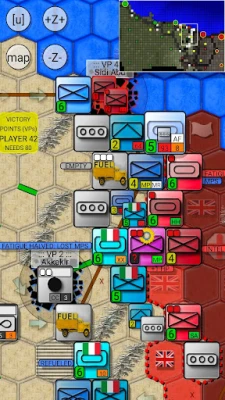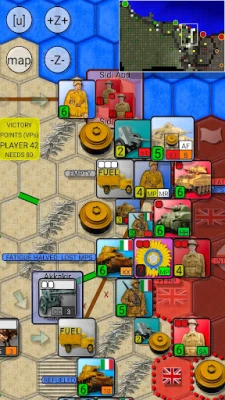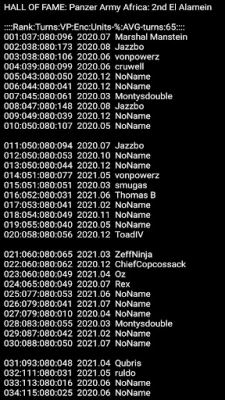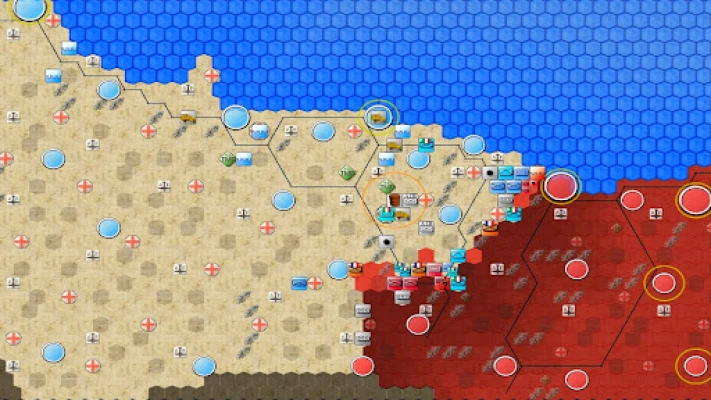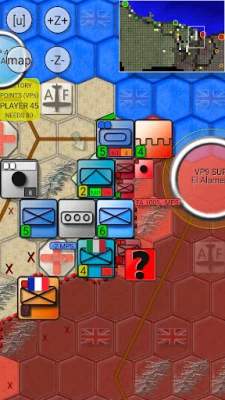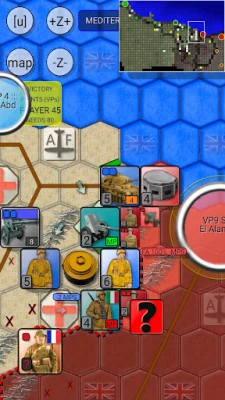
Latest Version
3.1.0.2
October 14, 2025
Joni Nuutinen
Games
Android
0
$3.99
com.cloudworth.elalamein
Report a Problem
More About Panzer Army Africa: El Alamein
The Battle of El Alamein: A Turning Point in North African Campaign
The words of Field Marshal Erwin Rommel, commander of the Afrika Korps, resonate with the weight of history: "We are being crushed by the enemy weight... We are facing very difficult days, perhaps the most difficult that a man can undergo." This statement encapsulates the dire situation faced by Axis forces in North Africa during the summer of 1942, particularly at the pivotal Battle of El Alamein.
Historical Context: The North African Campaign
In the summer of 1942, the Axis powers, primarily Germany and Italy, found themselves at a critical juncture in their North African campaign. Their advance into Egypt aimed to seize control of the Suez Canal, a vital artery for Allied supply routes. However, as they approached El Alamein, their momentum faltered. Overstretched supply lines and the relentless control of the Mediterranean Sea by Allied forces severely limited their operational capabilities.
Logistical Challenges: The Fuel Crisis
One of the most significant challenges faced by the Axis forces was the lack of fuel. The inability to maintain adequate supplies hampered their mechanized units, leaving them vulnerable and unable to execute grand maneuvers. Rommel understood that without fuel, his forces could not sustain an offensive. The only viable option was to fortify their positions and prepare for the inevitable British counteroffensive.
Strategic Resilience: Montgomery's Approach
On the other side of the battlefield, General Bernard Montgomery, commander of the British 8th Army, adopted a methodical approach. Despite pressure from Winston Churchill to launch an immediate attack, Montgomery chose to stockpile resources and build a formidable force. This strategic patience allowed him to vastly outnumber and outgun the Axis forces, setting the stage for a decisive confrontation.
The Defensive Counter-Strike: Rommel's Last Stand
As the British forces prepared for their offensive, Rommel recognized the critical nature of the situation. His one chance to halt the Allied advance lay in a decisive defensive counter-strike using his armored divisions. The stakes were high; failure would mean the collapse of the Axis position in North Africa. Rommel's tactical acumen was put to the test as he sought to leverage his remaining resources against a superior enemy.
Features of the Battle: A Unique Wargaming Experience
The Battle of El Alamein has inspired numerous wargames that capture the essence of this historical conflict. These games offer players a chance to engage with the strategic complexities of the campaign, featuring:
- Logistic Dimension: Players must manage fuel depots and supply trucks to keep their mechanized forces operational.
- Historical Accuracy: The campaigns reflect the actual historical setup, providing an authentic experience.
- Smart AI Technology: Each game presents a unique experience, thanks to built-in variations and advanced AI.
- Multi-layered AI: Opponents balance strategic goals with tactical maneuvers, such as encircling enemy units.
- Customizable Settings: Players can alter the gaming experience by changing difficulty levels, hexagon sizes, animation speeds, and unit icon sets.
The Turning Point: Allied Victory at El Alamein
As the battle unfolded, the British forces, bolstered by superior numbers and resources, launched their offensive. General Sir Alan Brooke, Chief of the Imperial General Staff, famously declared, "We have stopped Rommel and we are going to drive him back." This statement marked a significant turning point in the North African campaign, as the Allies began to reclaim territory and push the Axis forces into retreat.
Conclusion: The Legacy of El Alamein
The Battle of El Alamein stands as a testament to the importance of logistics, strategy, and resilience in warfare. The challenges faced by Rommel and the Axis forces highlight the critical role that supply lines and resource management play in military success. As history shows, the Allied victory at El Alamein not only marked a turning point in the North African campaign but also set the stage for subsequent victories in World War II.
In the realm of wargaming, the lessons learned from this historic battle continue to resonate, offering players a chance to engage with the complexities of military strategy and the realities of warfare. Whether through managing logistics or executing tactical maneuvers, the spirit of El Alamein lives on in the minds of gamers and historians alike.
Rate the App
User Reviews
Popular Apps










Editor's Choice











